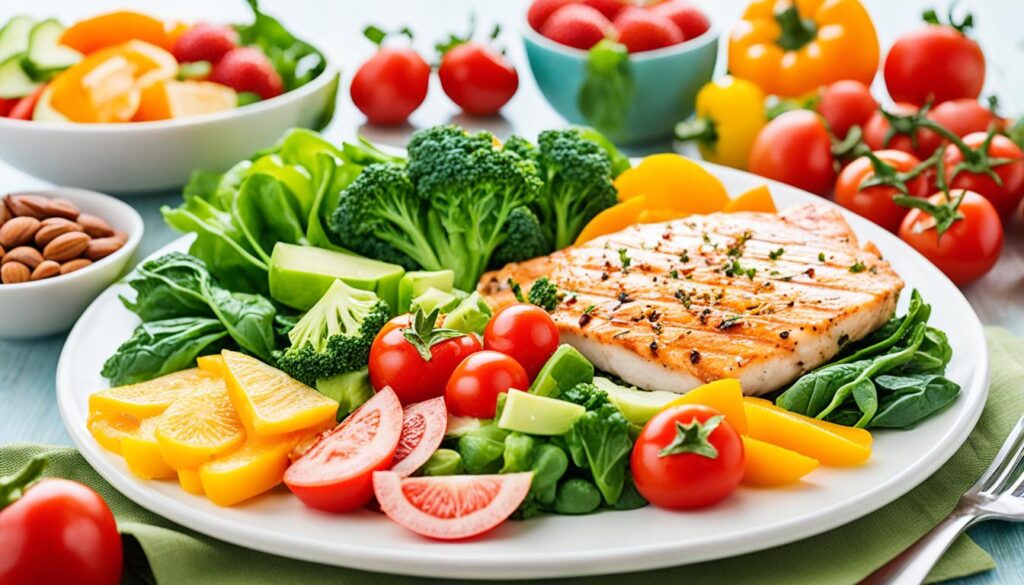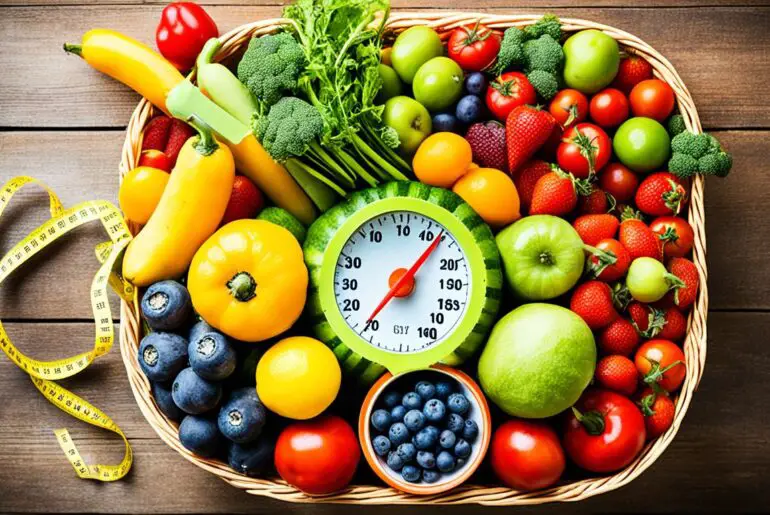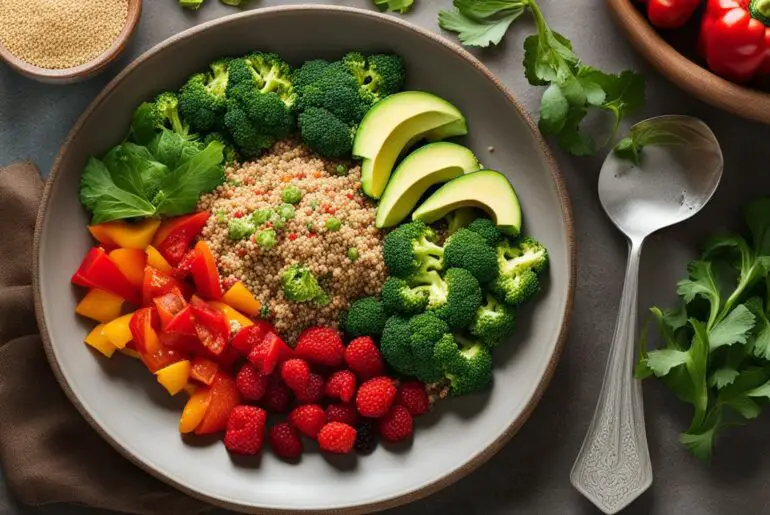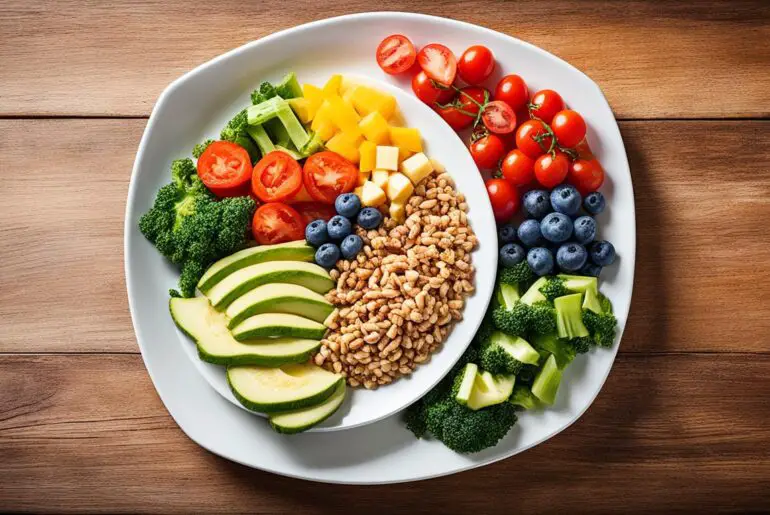Are you looking for a weight loss plan that promises rapid results? Have you heard about the HCG Diet but are uncertain about its effectiveness and safety? If so, you’re not alone. The HCG Diet has gained both popularity and controversy in recent years, leaving many people wondering if it’s the right choice for them.
In this comprehensive guide, I will break down the HCG Diet and its meal planning for weight loss. We’ll explore the science behind the diet, the different phases involved, and the foods allowed. Additionally, we’ll discuss sample meal plans, safety considerations, and alternatives to the HCG Diet.
So, is the HCG Diet the magic solution for your weight loss goals? Let’s dive in and find out!
Key Takeaways:
- Understand the science and protocol behind the HCG Diet for weight loss.
- Discover the approved foods and meal ideas for each phase of the HCG Diet.
- Learn about the potential side effects and safety considerations of the HCG Diet.
- Explore sample meal plans and alternatives for effective and safe weight loss.
- Consult with a healthcare professional before starting any weight loss program.
The HCG Diet Protocol
The HCG Diet protocol involves the integration of HCG hormone supplementation with a low-calorie diet to achieve weight loss. This diet is divided into three distinct phases: the loading phase, weight loss phase, and maintenance phase.
The loading phase: During this phase, participants consume high-fat and high-calorie foods to prepare the body for the subsequent calorie restriction. This phase typically lasts for two days.
The weight loss phase: In this phase, participants limit their calorie intake to either 500 or 800 calories per day, depending on the specific plan. Simultaneously, HCG hormone supplementation is continued. This combination is thought to enhance fat loss while preserving muscle mass. The weight loss phase typically lasts for three to six weeks.
The maintenance phase: After completing the weight loss phase, participants gradually increase their calorie intake bringing it back to a more sustainable level. HCG hormone supplementation is discontinued during this phase. The duration of the maintenance phase varies depending on individual weight loss goals and specific program guidelines.
The HCG Diet protocol is known for its strict adherence to a low-calorie diet while incorporating the HCG hormone. It is important to note that the HCG Diet is controversial and not recognized as safe or effective by health experts. The FDA has also issued warnings against the use of HCG hormone supplements for weight loss due to potential health risks.
Despite the controversy, proponents of the HCG Diet claim rapid weight loss results and improved body composition. However, it is crucial to consider all aspects of the diet, including potential risks and side effects, before deciding to embark on this weight loss journey.
Foods Allowed on the HCG Diet

In order to adhere to the guidelines of the HCG Diet during the weight loss phase, there is a list of approved foods that can be consumed. This ensures that participants are staying within the prescribed calorie limits while still nourishing their bodies with essential nutrients. Here is a breakdown of the foods allowed on the HCG Diet:
Lean Proteins
- Chicken
- Egg whites
- White fish
- Crab
- Lobster
- Scallops
- Extra-lean beef
- Bison
Specific Vegetables
- Spinach
- Chard
- Beet greens
- Cabbage
- Lettuce
- Celery
- Cauliflower
- Broccoli
- Asparagus
- Tomatoes
- Onion
- Shallots
- Radishes
Approved Fruits
- Berries
- Citrus fruits
- Apples
Approved Seasonings
- Garlic
- Lemon juice
- Salt
- Pepper
- Rosemary
- Thyme
It is important to note that dairy products, grains, fats and oils, sugary foods, and beverages such as soda and alcohol are not allowed on the HCG Diet.
For a visual representation of the approved foods on the HCG Diet, refer to the table below:
| Lean Proteins | Specific Vegetables | Approved Fruits | Approved Seasonings |
|---|---|---|---|
| Chicken | Spinach | Berries | Garlic |
| Egg whites | Chard | Citrus fruits | Lemon juice |
| White fish | Beet greens | Apples | Salt |
| Crab | Cabbage | Pepper | |
| Lobster | Lettuce | Rosemary | |
| Scallops | Celery | Thyme | |
| Extra-lean beef | Cauliflower | ||
| Bison | Broccoli | ||
| Asparagus | |||
| Tomatoes | |||
| Onion | |||
| Shallots | |||
| Radishes |
By following the HCG Diet and consuming these approved foods, participants can ensure they are on track with their weight loss goals while still maintaining a balanced and nutritious intake.
Sample HCG Diet Meal Plan
While there is no specific meal plan for the HCG Diet, a typical day on the diet might include:
- Coffee or tea for breakfast
- A lean protein source with approved vegetables for lunch and dinner
- A small serving of approved fruit
Ideally, meals should be spread out throughout the day to help manage hunger and maintain energy levels. It’s important to note that the total calorie intake should not exceed the recommended limit of 500 or 800 calories, depending on the specific plan.
For those following the HCG Diet, there are many online resources that provide sample meal plans and recipes to help with meal preparation and variety.
Avoiding Restricted Foods on the HCG Diet

To adhere to the HCG Diet and optimize your weight loss results, it is crucial to avoid restricted foods. These foods are not permitted on the HCG Diet protocol as they can hinder the desired effects of the diet. By eliminating them from your meal plan, you can stay on track and maximize your progress.
Foods to Avoid on the HCG Diet
When following the HCG Diet, it is important to steer clear of the following restricted foods:
- Dairy products: This includes cheese, yogurt, milk, and ice cream. These products are high in calories, fats, and sugars, which can impede your weight loss efforts on the HCG Diet.
- Grains: Bread, pasta, rice, and other grains should be strictly avoided. They are high in carbohydrates and can hinder the fat-burning process that the HCG Diet aims to promote.
- Fats and oils: Oils, butter, margarine, and other fat sources should be eliminated from your diet. These high-calorie foods can sabotage your weight loss goals on the HCG Diet.
- Sugary foods: Candy, chocolate, sweets, and other sugary treats are off-limits on the HCG Diet. They provide empty calories and can lead to cravings, hunger, and potential weight gain.
- Beverages: Soda, fruit juices, energy drinks, and alcohol should be avoided. These beverages are high in sugar and calories, and they can hinder your progress on the HCG Diet.
By strictly following the approved food list and avoiding these restricted foods, you can optimize your weight loss results and achieve the desired effects of the HCG Diet.
Restricted Foods on the HCG Diet
| Food Category | Foods to Avoid |
|---|---|
| Dairy Products | Cheese, yogurt, milk, ice cream |
| Grains | Bread, pasta, rice, oats |
| Fats and Oils | Oils, butter, margarine |
| Sugary Foods | Candy, chocolate, sweets, desserts |
| Beverages | Soda, fruit juices, energy drinks, alcohol |
Avoiding these restricted foods will help you stay on track with your HCG Diet journey. Remember to focus on the approved food list and make healthy choices to support your weight loss goals.
Safety and Effectiveness of the HCG Diet
The safety and effectiveness of the HCG Diet continue to be a subject of intense debate. Proponents of the diet claim that it leads to rapid weight loss, while health experts and the FDA urge caution and raise concerns about its use. Numerous studies have shown that any weight loss experienced during the HCG Diet is primarily due to the extreme calorie restriction rather than the effects of the HCG hormone itself.
Health authorities consider the HCG Diet to be highly unsafe and unhealthy. In fact, the use of over-the-counter HCG products for weight loss is illegal. It is crucial to understand that the diet’s drastic calorie reduction can have adverse effects on the body, potentially leading to nutrient deficiencies and other health complications.
“Many studies have found that any weight loss experienced on the HCG Diet is likely due to the extreme calorie restriction rather than the HCG hormone itself.”
Therefore, it is essential to consult with a healthcare professional before considering the HCG Diet to ensure your safety and well-being. They can provide you with comprehensive information and guide you toward healthier and more evidence-based weight loss strategies.
Potential Risks and Dangers
When undergoing the HCG Diet, it is important to be mindful of the potential risks and dangers associated with it. The severe calorie restriction can lead to various side effects, such as hunger, headaches, fatigue, dizziness, and even nutrient deficiencies. Furthermore, the HCG hormone is not regulated by the FDA for weight loss purposes, which means the quality and safety of over-the-counter HCG products are questionable.
The Importance of Evidence-Based Approaches
Instead of relying on controversial and potentially harmful diets like the HCG Diet, it is advisable to consider evidence-based approaches to weight loss. There are numerous safe and effective diets available that focus on balanced nutrition, portion control, and regular physical activity. Consulting with a registered dietitian or healthcare professional can help you find the best approach that aligns with your needs and health goals.
Duration of HCG Diet Treatment

The duration of HCG Diet treatment can vary depending on an individual’s weight loss goals and progress. Typically, those aiming to lose 15 pounds or less require 26 days of treatment, which includes 23 daily injections of HCG hormone. After the last injection, participants continue with the calorie-restricted diet for an additional three days. This period allows for the completion of the HCG protocol before transitioning back to a normal diet.
If a greater amount of weight loss is desired, the HCG Diet can be extended for up to 43 days. However, it is important to note that 43 days is the maximum recommended time for safety and effectiveness. Following the recommended protocol and consulting with a healthcare professional is crucial to ensure the diet is carried out correctly.
The duration of treatment may vary depending on an individual’s progress and adherence to the diet plan. It is important not to extend the HCG Diet without appropriate medical guidance as prolonged calorie restriction can have negative impacts on overall health and well-being.
Important Considerations:
- Consult with a healthcare professional before starting the HCG Diet to assess its suitability for your specific health needs.
- Follow the recommended protocol and guidelines provided by your healthcare professional or wellness coordinator.
- Do not start the normal diet until all HCG has been eliminated from your body.
- Ensure proper disposal of used needles and syringes to prevent injury and contamination.
Expert Quote:
“The duration of the HCG Diet treatment should be tailored to an individual’s weight loss goals and overall health. It is important to strike a balance between achieving desired results and maintaining safety throughout the process.” – Dr. Rachel Johnson, Registered Dietitian
Getting Started with the HCG Diet

To embark on a successful HCG Diet journey, it is crucial to begin with proper guidance and support. A consultation with a healthcare provider or a wellness coordinator is highly recommended to ensure a safe and effective experience. They have the expertise to provide personalized advice and monitor your progress throughout the diet.
The HCG Diet often involves self-administered injections, which require careful instructions and preparations. It is essential to follow the recommended protocol to ensure accurate dosing and minimize any discomfort.
When starting the HCG Diet, it is important to have a complete supportive program for weight loss rather than attempting to DIY (Do-It-Yourself). By seeking professional support and guidance, you significantly increase your chances of success in meeting your weight loss goals.
“Achieving weight loss success with the HCG Diet is easier with guidance and support.”
What to Expect during the Consultation
During the consultation, your healthcare provider or wellness coordinator will assess your overall health, discuss your weight loss goals, and determine if the HCG Diet is a suitable option for you. They may also provide additional resources and recommendations to enhance your weight loss journey.
Preparing for Injections
When preparing for self-administered injections, it is important to follow proper hygiene practices. Wash your hands thoroughly and clean the injection site with an alcohol swab before each injection. Make sure to use sterile needles and dispose of them safely after each use.
Supplies Needed for Injections
To ensure a smooth administration of injections, gather the following supplies:
- HCG hormone vial
- Syringe with the appropriate needle size
- Alcohol swabs
- Sharps container for safe needle disposal
—
| Tip: | Store HCG hormone vials in the refrigerator to maintain potency. Follow any storage instructions provided by your healthcare provider or wellness coordinator. |
|---|
As you proceed with the HCG Diet, it is crucial to stay consistent with your injections and maintain open communication with your healthcare provider or wellness coordinator. They can address any concerns or questions you may have and provide ongoing support throughout your weight loss journey.
Potential Side Effects and Considerations

While the HCG Diet promises rapid weight loss, it is important to be aware of potential side effects and considerations before embarking on this journey. The extreme calorie deprivation involved in this diet can lead to various side effects, including:
- Hunger: Due to the severe calorie restriction, participants may experience persistent hunger, which can make the diet challenging to sustain.
- Headaches: Some individuals on the HCG Diet may experience frequent headaches, which can be attributed to the drastic decrease in calorie intake.
- Brain Fog: Cognitive functions may be affected, leading to difficulties in concentration, memory, and overall mental clarity.
- Fatigue: Energy levels may plummet due to the significant reduction in calorie intake, leading to feelings of weakness and exhaustion.
- Dizziness: The combination of low-calorie intake and HCG supplementation can cause dizziness and lightheadedness.
Prolonged calorie restriction can also result in nutrient deficiencies, as the limited food choices on the HCG Diet may not provide a well-rounded range of essential vitamins and minerals. This can impact overall health and increase the risk of developing disordered eating patterns.
It is crucial to consider the lack of oversight for over-the-counter HCG supplements. The content and quality of these supplements may not be regulated, leaving users uncertain of their safety and efficacy.
To ensure safety and minimize potential risks, it is essential to consult with a healthcare professional or registered dietitian before starting the HCG Diet. They can provide personalized guidance, monitor your progress, and address any concerns that may arise during the diet.
Alternatives to the HCG Diet

Considering the safety concerns and lack of evidence supporting the effectiveness of the HCG Diet, it is essential to explore alternative weight loss options. There are numerous safe and effective diets available that prioritize healthy lifestyle changes, balanced nutrition, and regular physical activity.
When seeking an alternative to the HCG Diet, it is advisable to consult with a registered dietitian or healthcare provider. They can provide personalized guidance and help identify the best approach for individual weight loss goals.
Safe and Effective Diets
- The Mediterranean Diet: This diet emphasizes consuming fresh fruits, vegetables, whole grains, lean proteins, and healthy fats, such as olive oil. It has been associated with various health benefits, including weight loss and improved heart health.
- The DASH Diet: Designed to lower blood pressure, the DASH Diet focuses on consuming fruits, vegetables, whole grains, lean proteins, and low-fat dairy products. It promotes a well-balanced eating plan that can support weight loss.
- The Flexitarian Diet: This flexible approach to eating encourages primarily plant-based foods while allowing occasional inclusion of meat and dairy. It promotes weight loss while providing the flexibility to accommodate individual preferences.
- The Weight Watchers Diet: Weight Watchers utilizes a point-based system that assigns values to different foods, allowing participants to make healthier choices. It emphasizes portion control and encourages a balanced, sustainable approach to weight loss.
These are just a few examples of safe and effective diets that can be considered as alternatives to the HCG Diet. Remember that a well-rounded, nutrient-dense eating plan, combined with regular physical activity, is the key to long-term weight management and overall health.
Conclusion
The HCG Diet, with its combination of HCG hormone supplementation and extreme calorie restriction, has garnered significant controversy in the field of weight loss. While it promises rapid weight loss, its safety and effectiveness are highly debated among health experts. Concerns regarding potential side effects and the lack of scientific evidence supporting its efficacy have led many to explore alternative weight loss options.
When it comes to achieving sustainable weight loss, it is crucial to prioritize overall health and well-being. Instead of resorting to drastic measures, such as the HCG Diet, consider focusing on healthy lifestyle changes. Safe and effective alternatives exist that promote a balanced approach, incorporating nutritious meals, regular physical activity, and positive habits.
Consulting with a healthcare professional, such as a registered dietitian, can provide personalized guidance and support in choosing the right approach for your weight loss journey. They can help develop a customized plan tailored to your specific needs and goals, ensuring that you embark on a safe and effective path towards achieving and maintaining a healthy weight.
FAQ
What is the HCG Diet?
The HCG Diet is a weight loss protocol that combines HCG hormone supplementation with a low-calorie diet.
What are the phases of the HCG Diet?
The HCG Diet consists of three phases: the loading phase, the weight loss phase, and the maintenance phase.
What foods are allowed on the HCG Diet?
Approved foods include lean proteins, certain vegetables and fruits, and specific seasonings.
Is there a sample meal plan for the HCG Diet?
While there is no specific meal plan, a typical day might include coffee or tea for breakfast, lean protein with approved vegetables for lunch and dinner, and a small serving of approved fruit.
What foods should be avoided on the HCG Diet?
Dairy products, grains, fats and oils, sugary foods, and certain beverages should be avoided.
Is the HCG Diet safe and effective?
The safety and effectiveness of the HCG Diet are highly debated, and health experts caution against its use.
How long does HCG Diet treatment last?
The duration varies depending on weight loss goals, typically ranging from 26 to 43 days.
How do I get started with the HCG Diet?
It is advisable to schedule a consultation with a healthcare provider or wellness coordinator to receive guidance and support.
What are the potential side effects of the HCG Diet?
Participants may experience hunger, headaches, fatigue, and dizziness due to extreme calorie deprivation, among other side effects.
Are there alternatives to the HCG Diet?
Yes, there are alternative weight loss options that focus on healthy lifestyle changes and balanced nutrition.




